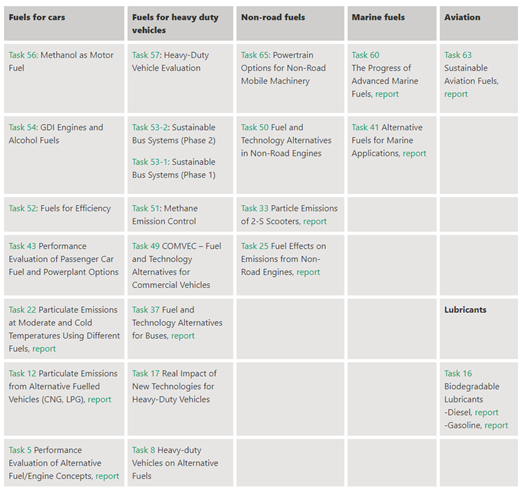Information Service and AMF Website
Purpose, Objectives, and Key Question
The purpose of Task 28 is to collate information in the field of advanced motor fuels and make it available to a targeted audience of experts in a concise manner.
Activities
- Review relevant news sources on advanced motor fuels, vehicles, and energy and environmental issues in general. News articles are provided by experts in the Americas, Asia, and Europe.
- Publish three electronic newsletters per year (on average) on the AMF TCP website, and use an email alert system to disseminate information about the latest issues.
- Issue No. 1 March 2024
- Issue No. 2 July 2024
- Issue No. 3 December 2024
- Prepare an Alternative Fuels Information System that provides concise information on alternative fuels and their use for transport. The system contains information on the performance of cars, effects of fuels on exhaust emissions, and compatibility of fuels with the needs of the transportation infrastructure.
- Update the AMF TCP website to provide information on issues related to transportation fuels, especially those associated with the work being done under the AMF TCP. In addition to providing public information, the website has a password-protected area for storing and distributing internal information for Delegates, Alternates, and Task Managers on diverse topics (e.g., strategies, proposals, decisions, and Executive Committee meetings of the AMF TCP).
- Complete additional activities, including distributing news on social media (beginning in 2020). Follow AMF TCP on LinkedIn.

Figure 1. Overview of AMF work on comparisons of advanced motor fuels in different transport sectors
Key Findings
The AMF website and newsletters provide a wealth of information on transportation fuels to experts and interested laypersons.
The website provides background information on the AMF TCP and its participants, access to all AMF publications, details regarding AMF Tasks, and information on fuels and their use in vehicles.
- Delegates to the AMF Executive Committee and Task Managers of AMF Tasks are listed on the website with full contact details and portraits.
- AMF Tasks are briefly described and―where available―final reports and brief key messages are presented. Project descriptions and reports date back to the beginning of AMF in 1984.
- Other publications include AMF annual reports, country reports, newsletters, and brochures.
- Information on specific fuel topics can be found either by searching in the Fuels Information System or by identifying a relevant Task in Figure 1 and checking the related report. Knowledge gained through AMF Tasks is frequently added to the system, making it a reference for experts and laypersons alike.
Newsletters are typically around 12 pages and are provided electronically (subscription is possible via the website). Topics covered are as follows:
- Demonstration/Implementation/Markets
- Policy/Legislation/Mandates/Standards
- Spotlights on Aviation, Shipping, and Asia
- IEA and IEA-AMF News
- Publications
- Events
AMF posts around one item per week on LinkedIn. Items focus on statements from AMF Task reports and Task key messages, and they also promote the AMF newsletter.
Publications
In 2024, the AMF TCP published three electronic newsletters, posted to the AMF TCP website and distributed it through the national networks of the AMF Delegates.
The Fuels Information System is available on the AMF TCP website. The AMF TCP website is updated frequently with information from Tasks and Executive Committee meetings.
|
Project Duration |
January 28, 2004 – Continuous |
|
Participants Task Sharing Cost Sharing |
None All contracting parties: Austria, Brazil, Canada, China, Denmark, Finland, Germany, India, Japan, Republic of Korea, Spain, Sweden, Switzerland, United States |
|
Total Budget |
EUR 55,000 (USD 59,950) |
|
Task Manager |
Dina Bacovsky BEST - Bioenergy and Sustainable Technologies GmbH |



